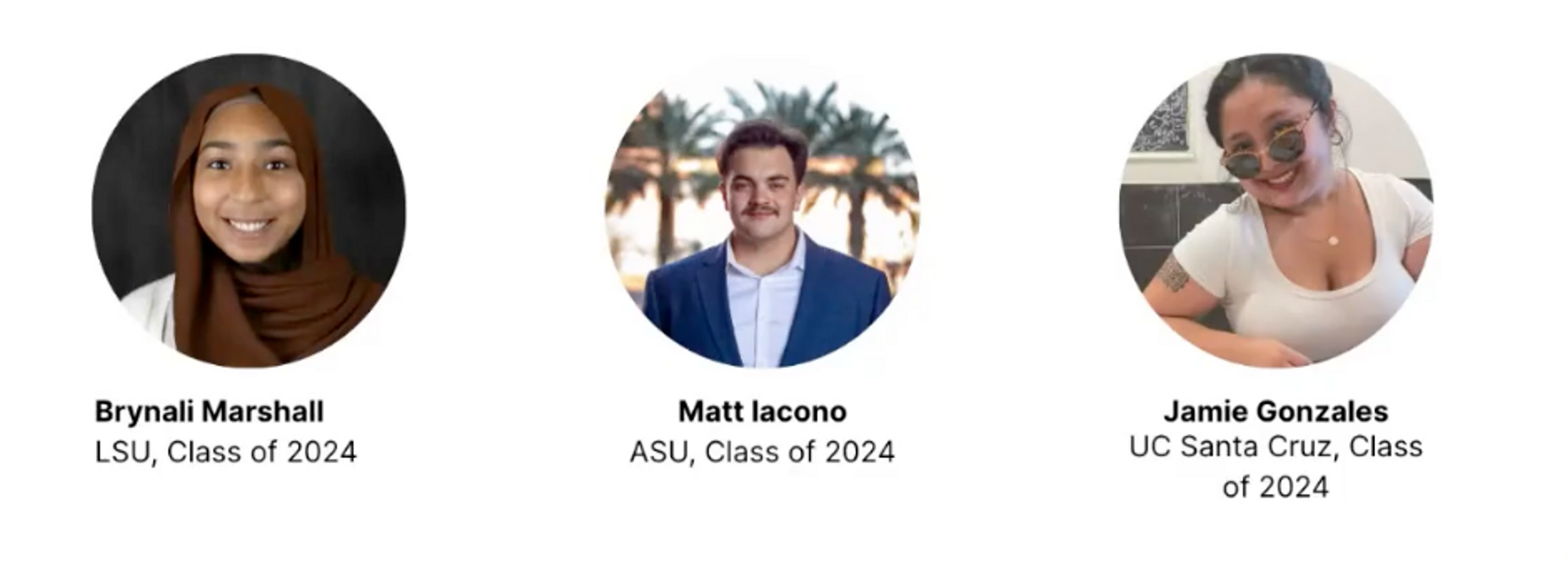During our back-to-school boot camp, we sat down with 3 upcoming graduates who shared how they’re searching for jobs, how employers can build their brand with Gen Z, and what attracts them to everything from a career fair booth to an internship to a full-time role.

Before we dive into the highlights from their conversation, you can watch the full video in Handshake’s back to school resource hub.
You’ll also find all the other sessions, including the top insights from the latest Handshake Network Trends report and best practices from companies like Ulta, Protviti, United Airlines, Ally, Milwaukee, and more.
Student panel Q&A
What are your career goals and hopes for after you receive your diploma?
Matt: I want to grow with a company that cares about my work ethic and entrepreneurial spirit. When I wake up every morning, I want to feel valued by my company and feel like my company gets value from my work as well.
Jamie: I just love working with people. I hope to attend physician assistant school after graduation, but I’d also like to continue working as a phlebotomist and content creator.
Brynali: I'm looking for a role in the commercial side of data analytics, specifically commercial technology. And definitely, like Matt said, somewhere with a really good work culture.
Graduation is just around the corner. How are you looking for jobs right now?
Jamie: I've been utilizing Handshake and my campus career center and plan to attend more virtual and in-person job fairs once they start the quarter.
Matt: Handshake is how I prepare for in-person events. I like in-person events because I believe it’s one of the greatest ways to meet the people at the company. When attending an event, I'm looking through Handshake for the employers that will be there and establishing who I want to talk to.
Brynali: Normally, I'm a big proponent of in-person events—but since I’m studying abroad right now, I will be attending a lot more virtual events this year and using Handshake as usual.
When you hear from employers on Handshake, what do you consider when deciding to engage or apply?
Brynali: I think that students try hard to differentiate ourselves from other applicants. However, I noticed that sometimes companies don't do the same. You can have an amazing company, but if they don't market themselves well and don't mention pay, work culture, work-life balance, or any like demographics in their roles—it doesn’t help show what makes them different.
Matt: As students, we do receive a lot of messages. Unfortunately, a lot of those messages seem to be the same. The more personalized the message is, the more likely I am to engage. I like the idea of messaging because it shows that they want to reach out to you, and if the message is more human and personalized, as well as their page, I am more likely to engage with those recruiters on Handshake.
Jamie: As Gen Z continues to enter the workforce, we take mental health and diversity seriously. Especially as a first-generation student, I want to hear about their office and what it's like to work with them.
How is the economy or financial concerns impacting your job search?
Jamie: I certainly have to think about carrying two jobs. Wherever I go after I graduate, I plan to continue my phlebotomy job. I’m majoring in global community health, so I hope to pursue that next side job, and I am a content creator.
Matt: Stability is the most important thing, ensuring a job is still available to them within the next five years. I also believe it's important to have interests that you really care about outside of school and work. Most of my friends work extra jobs now. I have a small business, and I look to continue that as a tool to make money and improve my personal skill set. There's a direct correlation between things I'm learning from my business and things I'm learning in school, and I expect I will be able to apply to the workforce. It's good for students to have interests, especially if those interests and hobbies are making money on the side. Still, unfortunately, with this economy, many have to do something on the side.
Brynali: I think that financial pressure weighs on my decision on whether I will go into my master's or not. How much would I make, and can I afford it without scholarships? Can I afford to go straight into the workforce?
What are your thoughts on salary negotiation, and how do you feel like employers can better set you and your peers up for success?
Brynali: Negotiating salary can be scary and intimidating, but it's necessary. Being able to use Handshake to see what salaries are out there gives me more confidence. I think that pay transparency is so, so important. Not only does it encourage a culture of trust and openness from the business to the employer, but it also makes sure that you, as an individual, aren't being undervalued for your work.
Matt: I wish more companies would post their pay transparency on Handshake. Pay is one of the most important aspects for most people when you are looking for a job. So, the more transparency, the better. While I feel equipped to negotiate salary, I also realize that other things are worth negotiating for, like benefits. I think students need more education on measuring the value of all the benefits.
Speaking of benefits, do you know where to find the information about them?
Matt: I feel like that information is normally pretty hard to access. I think companies could make a flyer or pamphlet that could be attached to their Handshake. That way, students don’t have to try to research and maybe miss the information.
Brynali: As a first-generation student, I often turn to my school’s career center to better understand the benefits. It's really important to have transparency in the benefits package so you can actually weigh out your opportunities.
When you're attending career fairs, what attracts you to companies?
Matt: I like to prepare before going to the career fairs so that I know what companies are looking for. The better the Handshake profiles employers have, the more it will attract me to their booth. I did notice that people gravitate towards booths with more lines. It's more about how they engage you and look at your resume, like if they plan on having an event later that day or anything that makes a bigger difference on how high I prioritize that employer.
Brynali: I really like personal conversation. I’ve been to job fairs where the recruiters seem like they don't want to talk to you, which discourages you from learning about the company. I've also had amazing conversations with recruiters. Company swag especially works if it's something unique. I remember I went to a booth that was a company that sells plumbing equipment and then had stress balls shaped like toilets, and now I remember the brand. Also, when booths have a raffle or a game, it makes it more approachable.
How impactful is it for employers to invest in your student loans or development?
Jamie: Both would attract me! I think it would be nice to have it stated in the job description. Or if you contact students on Handshake, send it in a message to really grab attention.
Brynali: I was fortunate enough to work quite a few jobs in college, so I didn't accrue student debt. But it’d even attract me because I'd see this company really cares about their employees.
Matt: Not just student debt, but any type of education, like if they're willing to pay some money for a master's or do any tuition reimbursement. It's definitely something I would value.
What catches your eye when looking at internships?
Brynali: Usually, for internships, you will be paid less. So for me, it's benefits. I looked at a job in California, and their benefits were amazing—transit pass, free lunch, and more.
Matt: Internships are a learning opportunity; I look for more specific internships where you can tell exactly what you're going to go into.
Jamie: 1:1 mentorship with one of the employees is a benefit that I would take advantage of, and more benefits for commuting.
And for full-time jobs?
Matt: It really comes down to this: meaningful work growth opportunities, stability, and balance. Anything that encompasses that, I just want to feel very confident every day waking up that I'm going to have my job, that I'm going to enjoy my job.
Brynali: I 1,000% agree with Matt. Everything we've mentioned—the company culture, the pay, the open communication.
Jamie: I think of it as a pie circle where it’s: does it fulfill financially? Does it fulfill me personally? Does it fill up what I can do educationally with it? [I’d weigh] those factors when considering accepting an offer.
To end with a buzzy topic: AI. Our Handshake Network Trends found the class of 2024 is more aware and less afraid of AI than event the class of 2023. What’s your view on AI?
Jamie: We're in the generation where AI is getting prominent, and I'm really happy that we're confident and not afraid of it. We can utilize it to our advantage. Even though my study is far from AI, I do personally use it as a student to help with tedious work like planning or scheduling.
Brynali: Data analytics and AI cross over so much, and AI is really creeping into every industry. I'm absolutely upskilling in AI. If I do choose to get my master's, it will be in machine learning. You really need humans to ensure the AI’s not making mistakes because, especially in commercial data analytics, it can cost the company millions of dollars.
Matt: I use AI for my business, and it's very important for it to become another skill set that students can use to help improve our quality and efficiency as workers.
Head to the hub for their full session and more Gen Z recruitment trends
Everything that you need for an impactful recruitment season. Access all the sessions that take current trends and give you evergreen tips to boost your employer brand, improve your candidate experience, and help you exceed all your early talent hiring goals.

